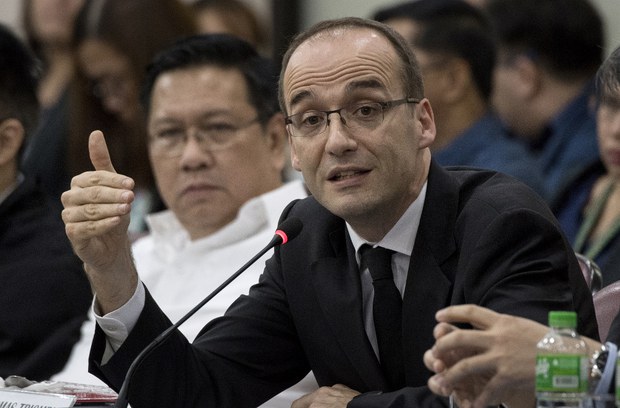French Firm Won't Fully Refund Philippines for Dengue Vaccine
2018.02.05
Manila
 Thomas Triomphe, Asia Pacific director of Sanofi Pasteur, gestures during a Philippine congressional inquiry in Manila regarding a dengue vaccine made by the French pharmaceutical firm, Feb. 5, 2018.
Thomas Triomphe, Asia Pacific director of Sanofi Pasteur, gestures during a Philippine congressional inquiry in Manila regarding a dengue vaccine made by the French pharmaceutical firm, Feb. 5, 2018.
A French pharmaceutical firm Monday rejected a Philippine government demand to fully refund about 3.2 billion pesos (U.S. $62 million) paid for a dengue vaccine found to be potentially hazardous and that health officials said could be linked to the deaths of three schoolchildren.
Sanofi Pasteur had already reimbursed Manila for unused doses of Dengvaxia in its inventory amounting to about 1.4 billion pesos ($27 million), or less than half of what the government had spent on the vaccine, Thomas Triomphe, the pharma giant’s Asia Pacific director, told a Philippine congressional inquiry.
He said the buyback was meant to show Sanofi’s commitment to the Philippines, the first country in Asia to approve the use of Dengvaxia against the mosquito-borne disease that infects about 200,000 Filipinos every year.
“I would like to stress that this has nothing to do with the safety and quality concern of the product, which there is none,” Triomphe told lawmakers.
Triomphe acknowledged replying to a demand letter from Philippine Health Secretary Francisco Duque on Monday morning.
“With all due respect, we decided to refuse the proposal of the secretary of health to actually reimburse the used doses,” he said.
Doing so would “imply that the product is ineffective,” Triomphe said, emphasizing that the drug was safe for public use.
“We stand, as previously mentioned, behind the efficacy and safety of the product and that is why we are not reimbursing the already-used doses,” he said. “In addition, we do believe that doing so will create confusion in the minds of the population where the parents of the kids who have been immunized completely [will have] the wrong impression of the efficacy of the product.”
“So we decline this request, your honor,” he told the congressional inquiry.
Deaths linked to Dengvaxia use
Triomphe testified a few days after the Department of Health released a study to examine possible links in 14 deaths to the use of Dengvaxia. Between March 2016 and October 2017, 830,000 primary students in the Philippines received doses of the vaccine as part of a nationwide school-based anti-dengue immunization drive.
Three cases showed a “causal association,” meaning that their deaths could be linked to Dengvaxia, the study found. Of the other 11 cases, three showed inconsistent “causal association to immunization,” two others were “unclassifiable” because of a lack of given information. Six others showed inconclusive results and further tests were needed.
“The children died due to dengue despite being vaccinated with Dengvaxia – two of which may be on account of vaccine failure,” the health department said, although it said further tissue samples were needed for testing to complete its investigation.
Soon before the Philippines suspended its Dengvaxia program in December, Sanofi issued an advisory warning that the drug could carry health risks for people who had no history of prior infection with dengue.
“The DOH (Department of Health) recognizes that these issues continue to cause fear and confusion especially to our parents whose children were given Dengvaxia,” the department said.
It said the results showed that Dengvaxia was “not fit for a mass immunization program that does not screen for prior dengue infection.”
The results have been handed over to the Justice Department as it continues post-mortem studies while investigating several health officials who allegedly worked with Sanofi Pasteur to roll out the vaccine.
Sanofi, as well as ex-president Benigno Aquino III, who appeared earlier at the congressional probe, denied allegations of corruption involved in purchasing the drug.
While the case-fatality rate of those infected with the disease remains low, the health department said it acknowledged that the many parents had been spooked from voluntarily receiving free vaccinations for their children from the government. Experts warn that this could reverse earlier gains in combating common diseases, such as flu.
Indemnity
Anthony Leachon, an independent director of the government medical insurance body, PhilHealth, said Sanofi must be held accountable.
“They should be made to pay,” Leachon said. “If they will not pay, I suggest that government blacklists them and sends them home to France for good.”
Meanwhile, many mothers, especially those whose children go to public schools, now doubt the government’s health programs.
“That repercussion is not surprising,” said Julie Caguiat, whose group, the Coalition for People’s Right to Health has been closely observing the case. “The government needs to be truthful in its probe because the public’s trust would not be regained if it does not make those responsible accountable for their mistakes.”
President Rodrigo Duterte has refused to criticize Aquino, his predecessor and a critic of his government. He had said that if he were in Aquino’s shoes, he may have also allowed Dengvaxia’s release because studies at that time showed it was effective.
On Monday, Duterte spokesman Harry Roque said government physicians were under instructions to continue with their independent autopsies because it was necessary to establish the truth.
He also warned Sanofi that the government investigation was ongoing and the results would be forwarded to the justice department.
“They must be dreaming if they think they’re off the hook,” Roque said of the Sanofi officials.
“Let us not make any conclusion either way. No one is responsible and yet, no one is off the hook at this stage. Dream on, Sanofi,” he said.







